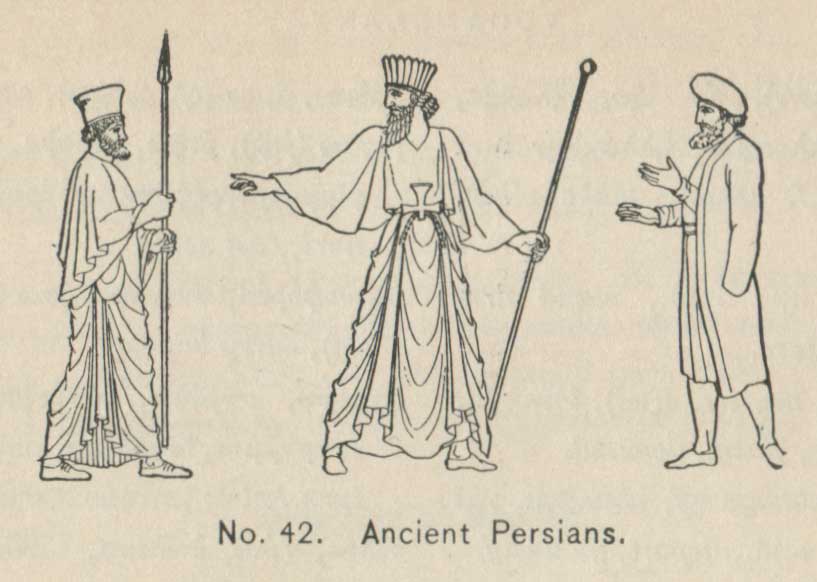THE FIRST GREEK BOOK
BY JOHN WILLIAMS WHITE, PH.D, LL.D., LITT.D.
Professor Of Ancient Greek At Harvard University
This Revision Copyright ©2012 by Shawn Irwin
Lesson LXI - Future and First Aorist Systems of Vowel and Mute Verbs, Indirect Discourse
S565. Review 553, 2 and 3, 274, and 90.
S566. Conjugate the future and first aorist systems of λύω in 766 and 767,
giving the moods in order, down the columns, first in the active, then in the middle.
Give the synopsis of the future system of λύω in the active, in the middle; of the
first aorist system of λύω in the active, in the middle.
S567. Review 560, 1 and 2. In these examples the verb in the principal clause is in a primary tense (50), and
there is no change in either the mood or the tense of the quoted verbs.
S568.
1. ἔλεξεν ὅτι (or ὡς) γράφοι
(or γράφει) ἐπιστολήν.
He said that he was writing a letter.
2. ἠρώτησε τί (or ὅ τί)
βούλοισθε (or βούλεσθε).
He asked what you wanted.
In these examples there may be a change from the indicative to the optative, but the tense remains the same;
the verb in the principal clause is in a secondary tense (50).
S569. After a primary tense, an indicative (without ἄν),
in indirect quotations after ὅτι and ὡς, and in
indirect questions, retains both its mood and its tense. After a secondary tense it is either changed to
the same tense of the optative or retained in the original mood and tense.
S570.
1. οὕτως ἂν τὴν ἐπιστολὴν ἔγραψα.
In that case I should have written the letter.
2. λέγει ὅτι (or ὡς) οὕτως ἂν τὴν ἐπιστολὴν ἔγραψε.
He says that in that case he should have written the letter.
3. ἔλεξεν ὅτι (or ὡς) οὕτως ἂν τὴν ἐπιστολὴν ἔγραψε.
He said that in that case he should ,have written the letter.
S571.
1. ἆρ᾽ ἐπιστολὴν ἂν γράψειας;
Would you write a letter?
2. ἐρωτᾷ εἰ ἐπιστολὴν ἂν γράψειας.
He asks whether you would write a letter.
3. ἠρώτησεν εἰ ἐπιστολὴν ἂν γράψειας.
He asked whether you would write a letter.
The verb in the quoted sentence retains its original mood and tense (an indicative or optative with
ἂν), whether the verb which it follows is primary or secondary.
S572. After both primary and secondary tenses, an indicative or optative with ἂν, in indirect quotations with
ὅτι or ὡς, and in indirect questions, retains both its
mood and its tense (with ἂν).
S573. VOCABULARY
διατρίβω, rub through, consume, waste time, delay
ἔνθα, (compare ἐν) adverb of place, where, there, here; of time, then, thereupon.
ἐργάζομαι, (ἐργαδ), ἐργάσομαι, ειργασάμην, εἴργασμαι, (compare ἔργον), work, do, inflict on.
θάπτω, (ταφ), θάψω, ἔθαψα, τέθαμμαι, ἐτάφην, bury.
κηρύττω, (κηρυκ), κηρύξω, ἐκήρῡξα, κεκήρῡχα, κεκήρῡγμαι, ἐκηρύχθην, (compare
κῆρυξ), proclaim, make proclamation.
κρύπτω, (κρῡφ), κρύψω, ἔκρῡψα, κέκρυμμαι, ἐκρύφθην, hide, conceal, keep secret.
κωμήτης, ου, ὁ, (compare κώμη), villager.
οἴκοι, (compare οἰκίᾱ), adverb, at home;
οἱ οἴκοι, those at home, ones countrymen. See 23.
τελευταῖος, ᾱ, ον, (compare τελευτή), last. οἰ τελευταῖοι, the rear guard.
τρίβω, τρίψω, ἔτρῑψα, τέτρῑφα, τέτρῑμμαι, ἐτρίβην and ἐτρίφθην, rub.
χιών, όνος, ἡ, snow.
Give the original forms of the indirect quotations and questions in the following exercise (574).
S574.
1. ἐκέλευσε δὲ τοὺς στρατηγοὺς συντάξαι τοὺς Ἕλληνας.
2. οἱ δὲ διώξαντες ταχὺ επαύσαντο.
ταχὺ, The neuter of the adjective is here used as an adverb.
3. ἐδόκει γὰρ Κῦρος ἥξειν βασιλέᾱ σὺν τῷ στρατεύματι μαχούμενον.
4. πέμψον κωμήτᾱς σκεψομένους πῶς ἔχουσιν οἱ τελευταῖοι.
ἔχουσιν, compare καλῶς ἔχουσιν.
5. ἔνθα δὴ Κῦρος ἔδεισε μὴ βασιλεὺς κατακόψειε τό Ἑλληνικόν.
6. ὅτι δὲ ἐπὶ βασιλέᾱ ἄγοι οὐκ ἤκουσαν οἱ στρατιῶται.
7. ἠρώτων Κῦρον τί βούλοιτο τῇ στρατιᾷ χρήσθαι.
χρήσθαι, cοurage 562, 2.
8. καὶ Κῦρος ἔλεξεν ὅτι ἡ ὁδὸς ἔσοιτο πρὸς βασιλέᾱ μέγαν.
ἔσοιτο, Future optative of εἰμί.
9. ἀλλὰ διατρίψω ἵνα φοβῶνται οἱ άγγελοι μὴ οὐ τὰς σπονδὰς ποιησώμεθα.
10. ἡ χιὼν ἔκρυψε καὶ τὰ ὅπλα καὶ τοὺς ανθρώπους.
11. ἐκήρῡξαν οἱ στρατηγοὶ τοὺς ἄνδρας θάψαι.
12. ἔλεξεν ὅτι οὕτως ἂν τοὺς οἴκοι κακόν τί εἰργάσαντο.
οἴκοι, one of the two objects of ἂν εἰργάσαντο (839 ).
S575.
1. Orontas, thinking that the horsemen were ready, wrote a letter to the king.
2. I said that we had many fair hopes of victory.
3. He orders them to see what the hindrance is.
Use σκεπτομαι.
4. He collected an army by means of this money.
by means of, ἀπὸ.
5. The satrap said that Cyrus had plotted against the king.
S576. "You need not fear the Coming Struggle, and Success will bring Reward."
"ἐγὼ δὲ εἰς οἷον ἔρχεσθε ἀγῶνα ὑμᾶς διδάξω. τό μὲν γὰρ
πλῆθος τῶν βαρβάων πολύ ἐστι καὶ κραυγῇ πολλῇ ἐπέρχονται˙
ἂν δὲ ταῦτα ἀνάσχησθε,
τὰ ἄλλα αἰσχύνομαι οἷοι ἡμῖν οἱ ἐν
τῇ χώρᾳ εἰσὶν ἄνθρωποι. ἐὰν δὲ ὑμεῖς ἄνδρες ἦτε καὶ εὖ τὰ
ἐμὰ γένηται, ἐγὼ ὑμῶν τὸν μὲν οἴκαδε βουλόμενον ἀπελθεῖν
ζηλωτὸν ποιήσω τοῖς οἴκοι, πολλοὺς δὲ οἶμαι βουλήσεσθαι
παρ᾽ ἐμοὶ μένειν.
εἰς οἶον ἀγῶνα: into what sort of struggle you are going, indirect question introduced by
the relative οἶος, equivalent to Latin qualis. compare οἶοι in line 3.
κραυγῇ: dative of manner (866 ).
ταῦτα: i.e. their numbers and outcry.
ἀνάσχισθε: second aorist subjunctive middle of ἀν-έχω, hold up, middle, endure.
τὰ ἀλλα: accusative of specification (834), as to all else I am ashamed (to think) what sort of men my countrymen are.
τὰ ἐμα: my affairs, ὑμῶν τὸν βουλόμενον: whoever of you (partitive genitive, 842) shall wish.
For ὁ βουλόμενος, see 487, 3 and 4, 6.
ζηλωτόν: an object of envy.

See the route on the map.
End Of Chapter
INDEX
Chapter 62
HOME
This Revision Copyright ©2012 by Shawn Irwin
